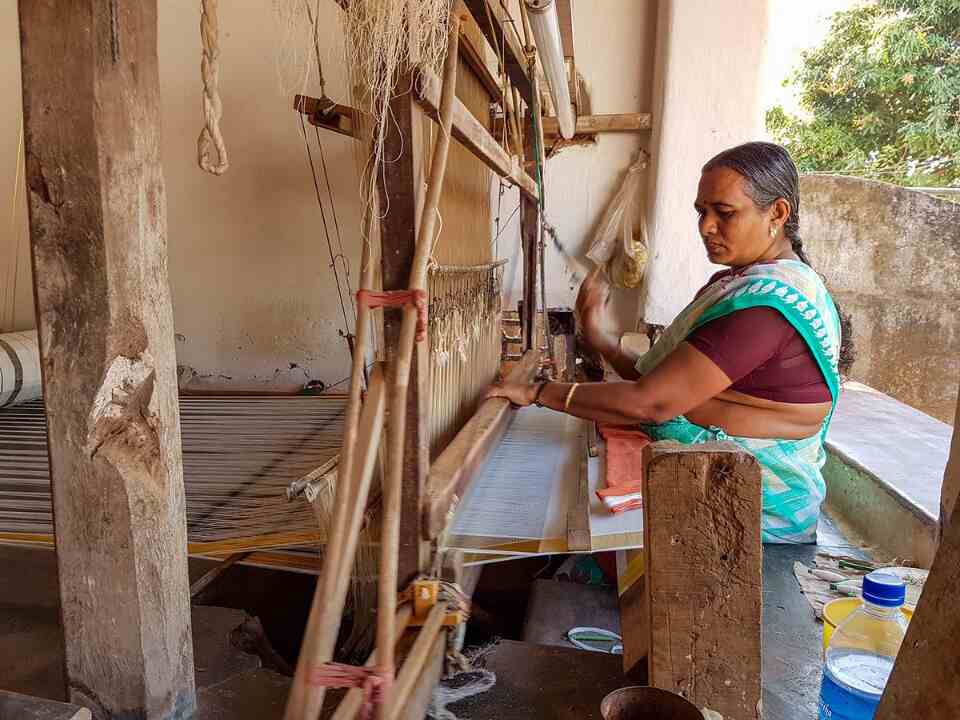A dying craft
Covid-19 has hit MSMEs worst and among these talented weavers suffer the most

36-year-old Wasim Akhtar can speak for hours about the intricacy of his craft. A master Benarasi weaver, even over the telephone, you can feel him smile, his eyes light up, as he voices his passion. Today, it's only a love for his profession that is seeing him through these dark and gloomy times. The Covid-19 first wave hit him hard, and with the cruel onslaught of the second wave scarcely over, and rumbling of a third, Wasim is despondent. He reminisces the glory of just a couple of years ago, when the ensembles he wove for a well-known Delhi designer, adorned models at the Lakme Fashion Week. Till last year he had 150 'karigars' or artisans working for him, today he has only 50. When Covid-19 first hit, Wasim used his personal savings of Rs 5 lakh to help his artisans and keep himself stay afloat. Now, he feels it's best to not make any new saris or lehengas, till an order is confirmed. Instead of spending his meagre funds on clothes that no one is buying, he has chosen to instead help his 'karigars'. At Rs 5,000 each, the artisans can at least survive and feed their families. This fifth-generation weaver, who has even been awarded by the government for his skill, may have to shut shop completely if the situation doesn't improve; this is the most dejected he's been since he entered the profession as a 13-year-old adolescent boy.
Wasim is not alone; the very existence of lakhs of weavers, artisans, and workers around the country is in jeopardy. The pandemic has been hard for almost all of us but while the big corporates have deep pockets and some like us are fortuitous to be able to scrape through, many talented craftsmen will perish in the pandemic. MSMEs in India are languishing in the doldrums with almost 4,900 of them up for sale, and double the number expected to follow in the wake of second and third waves, says online deal-making firm SMERGERS. According to a survey by Dun and Bradstreet, 82 per cent of 250 MSMEs that were surveyed, said that Covid-19 had hit them hard. A Reserve Bank of India report states that MSMEs are one of the five worst affected sectors in India. Artisans and weavers form even a smaller number within the industry that is largely unorganised.
When the first wave hit the world, countries such as the US gave doles to businesses and individuals helping them survive. The Indian government has offered a Rs 3 lakh crore package under 'Atmanirbhar Bharat Abhiyan' to provide collateral-free working capital support to MSMEs. The concessional loan at 5 per cent given by the Small Industries Development Board of India (SIDBI) for emergency support to MSMEs is not available for unorganised artisans. In any case, the paperwork for what are essentially loans that need to be paid back with interest is hardly an option for weavers like Wasim. When his Delhi designer stopped taking his calls and pending payments from other designers in the capital and cities like Hyderabad seemed in vain, Wasim had all but given up hope. At a time when all seemed lost, a citizen's collective stepped in bringing hope.
Talish Ray, a lawyer in Delhi, and five of her friends, started the volunteer-based Weaver Resource Bridge. Completely not-for-profit and driven by their own passion for textiles, history, and culture, this motley female crew has relentlessly persevered to help nine weavers from different parts of India. In just four weeks, they have helped Wasim as well as Jeela Pundiricam (a Pochampally weaver from Andhra Pradesh), Majid Mir (a pashmina weaver from Kashmir), and six others from states such as Madhya Pradesh and Tamil Nadu, sell their weaves raising Rs 30 lakhs. Their target is to reach Rs 1 crore by August 15; poignant that this reprieve for the nine craftsmen should come on Independence Day.
There are thousands more who need access to capital from the government that they don't have to pay back. An action plan that is focused on artisans and craftsmen needs to be activated at the state level with support from the Union textile ministry. These gifted artists don't expect handouts or charity from customers. They are ready to put in the work and produce priceless pieces of art; all they are looking for are willing customers. So, reach out to Talish on social media or find your local weaver, but we need to buy their wares so that they can survive these tumultuous times; lest the art and the artist vanish forever.
The writer is an author and media entrepreneur. Views expressed are personal
Image courtesy: Twitter/PARI Network




